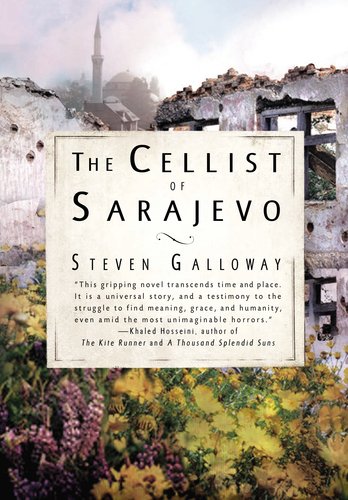All Nonfiction
- Bullying
- Books
- Academic
- Author Interviews
- Celebrity interviews
- College Articles
- College Essays
- Educator of the Year
- Heroes
- Interviews
- Memoir
- Personal Experience
- Sports
- Travel & Culture
All Opinions
- Bullying
- Current Events / Politics
- Discrimination
- Drugs / Alcohol / Smoking
- Entertainment / Celebrities
- Environment
- Love / Relationships
- Movies / Music / TV
- Pop Culture / Trends
- School / College
- Social Issues / Civics
- Spirituality / Religion
- Sports / Hobbies
All Hot Topics
- Bullying
- Community Service
- Environment
- Health
- Letters to the Editor
- Pride & Prejudice
- What Matters
- Back
Summer Guide
- Program Links
- Program Reviews
- Back
College Guide
- College Links
- College Reviews
- College Essays
- College Articles
- Back
The Cellist of Sarajevo by Steven Galloway
The historical fiction novel The Cellist of Sarajevo is written by Steven Galloway, who is also the author of the well-known novels Finnie Walsh and Ascension. He is a teacher of creative writing at the Simon Fraser University and the University of British Columbia. The novel takes place in the city of Sarajevo, the capital of Bosnia Herzegovina. It tells the story of three fictitious people’s experiences and their reactions to the 1992-1996 Siege of Sarajevo. During the Bosnian War, the Serbs laid siege to the city, continually attacking it with snipers and mortars from the surrounding hills.
An important aspect of the novel is that it utilizes the rhetorical strategy of temporal distortion (the usage of different timelines that do not occur in chronological order) to tell the independent stories of the three main characters that never actually meet. Their stories are solely connected by the presence of a cellist who plays Albinoni’s Adagio on a street of Sarajevo for twenty-two days to commemorate the victims that died while buying bread during a mortar attack. The three main characters are all dynamic, meaning that they change over the course of the novel, and their characters are all round because they are all very well developed.
One of the characters is a female sniper who has changed herself from an ordinary woman into the persona ‘Arrow’ who is a killer. She has exceptional ability and kills many enemy soldiers. She wants to show vengeance to the “men on the hills”, the besiegers of the city who are shooting mortars and bullets into Sarajevo. While she takes many lives, she does not target civilians, which reflects her resolution to only kill as a retribution for all the wrongs her victims have done. She does not kill them because she hates them for who they are.
Another character is Kenan, a humble man who has a family to support. Trying to bring water for his family and an unthankful old neighbor, he has to walk a long and perilous way every few days to bring this much needed necessity. The siege has strongly impacted Kenan and is changing him into what he later calls a “ghost”, meaning that he has lost joy in life and is starting to become a more negative and uncaring person. Kenan is becoming one of the many thousand souls whose hope, joy and life the siege has destroyed. As the story continues, it shows his struggle for survival and purpose in a once safe and prosperous city that has suddenly turned into a warzone.
The third main character is Dragan, a baker in his sixties. Due to his terror of dying and his fear of facing the reality of death and destruction, he has no joy left in his life. He has all but forgotten how pleasant Sarajevo used to be before the siege, and his outlook on life has become pessimistic and hopeless. His entire story takes place during one day, mostly at a dangerous intersection where many innocent civilians are being ruthlessly killed. There he meets Emina, a hopeful and optimistic friend who has an important and positive impact on Dragan’s character development.
The novel is well written and reasoned with only one significant distraction, which is that Galloway uses contractions that do not fit the tone. For example, Arrow says “I don’t think so” and “that’s not how I work” while the tone is very serious and tense. These contractions make the language sound colloquial and informal, which destroys the serious tone. On the other hand, Galloway incorporates numerous elements that improve the novel significantly, one of these being the appealing and relevant themes. For example, an important theme is that humans should help each other since they are responsible for themselves and for each other. This theme is well integrated into the book since it is included in all of the three major character’s stories. For example, it can be seen in Kenan’s life when he sees that it is important to care for his family and for other people, even if they are not nice in return. Also, this theme is very relevant to both the situation in the novel and to everyday life. It is relevant to the novel because the people of Sarajevo have to learn that they have to help each other to survive amidst a war. The same is true for today, because even though many people in the west do not live in such a terrible situation as the people of Sarajevo, it is still important to help each other. It is mainly this relevance and connection to reality that, despite the already mentioned shortcoming, makes The Cellist of Sarajevo such an excellent novel.
Similar Articles
JOIN THE DISCUSSION
This article has 0 comments.

